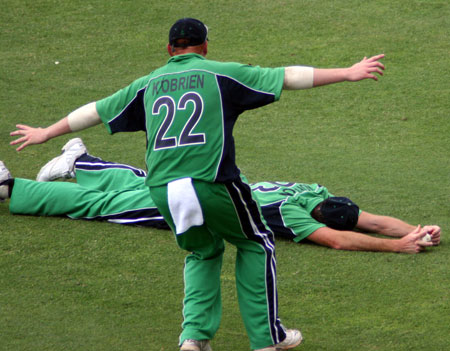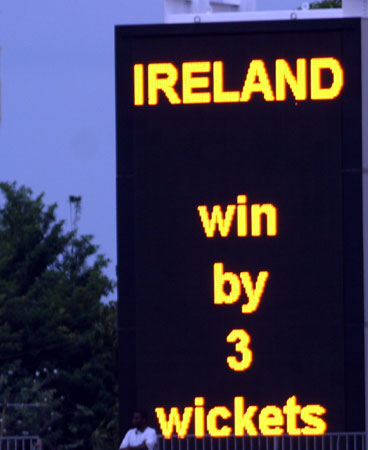 Andre Botha dismisses Inzaman-ul-Haq
Andre Botha dismisses Inzaman-ul-Haq
Irish cricket started the decade on a downward swing. The national coach, Ken Rutherford, was on his way out after an undistinguished period at the helm, with failure to qualify for the World Cup in 2001 a grievous disappointment.
His replacement, Adrian Birrell, took over in 2002 and began assembling a side that would not fail next time around. Boosted by the economic climate that attracted young Australians and South Africans here, he was able to augment the local talent with men who had played the game at a high level elsewhere. Wins at Stormont over Zimbabwe and West Indies showed the first signs of recovery.
Birrell was also able to temporarily draw on Ed Joyce, a richly talented batsman who led the way for a dozen Irish players in making a career in the English game. In the 2005 qualifying tournament Joyce made two hundreds and three fifties to ensure Ireland would be at the World Cup two years later. By the time that came around Joyce was playing for England and had just made a stunning century against Australia in Sydney.
 50 for Niall O' Brien
50 for Niall O' Brien
The fervour peaked two days later, St Patrick's Day, when Ireland took on Pakistan. One of the pre-tournament favourites, the mercurial Pakistanis were rocked from the start. On a tricky green pitch, opening bowlers Dave Langford-Smith and Boyd Rankin broke through early to have their opponents 15 for 2.
One by one the star batsmen came and went, stunning catch after stunning catch. The best of them all was held by inspirational captain Trent Johnston. Running backwards after a Kamran Akmal pull took a leading edge, he flung himself full-length and clung on to the ball with both hands. He shot his left arm out to break his fall but in so doing damaged a shoulder that affected him for months afterwards.
The rest of the attack was faultless, with Andre Botha's eight overs costing just five runs, as well as taking the scalps of captain Inzamam ul-Haq and Imran Nazir. "That spell was in the Glenn McGrath class," said Johnston.
Off-spinner Kyle McCallan came on to mop up the tail, with another cracking catch by sub fielder Johnny Mooney finishing things off. His football-style solo with the cricket ball endeared him to the watching Cayman Islands' GAA club and many more back home.
 Kevin and Niall O'Brien combine to take a wicket
Kevin and Niall O'Brien combine to take a wicket
William Porterfield and Niall O'Brien came together and put on almost 50, wearing down the new ball and keeping the score ticking over. Porterfield fell, then Botha, outrageously, to an umpiring blunder on a par with the Thierry Henry handball; 70 for 4.
 Trent Johnston takes a wonder catch
Trent Johnston takes a wonder catch
When Andrew White and McCallan fell on 113, Ireland were still 15 short with just three wickets in hand. Johnston strode out, shoulder strapped, to join Kevin O'Brien.
The captain stood next to umpire Billy Bowden, one of the game's characters, who muttered "Don't throw it away, you've done so well". The batsmen nudged the target down to four. Johnston was facing the experienced Azhar Mahmood, who delivered a slower ball out of the back of his hand. Johnston picked it up early, swung his bat through the ball and hammered it hard and high into the George Headley Stand. Before the ball had rattled into the seating, Johnston's two arms were aloft and his team mates were halfway to the wicket where they mobbed him seconds later.
Back home, pubs and clubs that had been transfixed, erupted in delight. The players eventually hauled themselves onto a coach for the two hour trek north to Ocho Rios where the bulk of their families and fans were staying, and the Sunset Grande Hotel was hosting a 'Jam Patrick's Day' bash. Most of the players saw the dawn arrive, enjoying celebrations of Irish cricket's greatest ever day.
 The scoreboard says it all!
The scoreboard says it all!
Adrian Birrell had been coached by Woolmer in South Africa: "He had a life-long affair with cricket. I never heard Bob talk about anything else. He was a great innovative thinker."
Woolmer's last words to Birrell the evening before he died were typically generous: "The toss didn't matter, you would have won anyway."
A big, cheery character, Woolmer had entertained the small Irish press corps the night before the game. As he sucked on a bottle of beer, he regaled us with some outrageous tales about his time in the game, and specifically about coaching Pakistan.
The initial post mortem indicated a natural death, but within days a different story was circulating Kingston. A press conference was called in the Pegasus Hotel to say Bob Woolmer's death was "murder caused by manual strangulation" in his bedroom twelve floors above. A feverish atmosphere enveloped the competition, with the sorrow at a fallen comrade replaced by gossip and finger-pointing.
 The fans go wild
The fans go wild
The Irish team moved on, qualifying for the Super Eight phase where they registered another win over a test nation, Bangladesh. Their performances at times against New Zealand, South Africa and, especially, England were good enough to allow brief dreams of another top scalp. Only against the eventual finalists, Australia and Sri Lanka, were they totally outclassed.
Ireland returned to a fitting welcome, and spent the rest of the year collecting awards, including the RTÉ Team of the Year.
After the World Cup, Birrell passed the baton to Phil Simmons, a former world-class all-rounder with the West Indies. Under Simmons the team has continued to grow, and new stars have emerged. McCallan retired earlier this month after 226 caps, a record for an Irish person in any sport.
Ireland again reached the Super Eights of the World Twenty20 in 2009, and also qualified for the next 50 over World Cup, which will be held in India, Bangladesh and Sri Lanka in 2011. Since Johnston gave it an almighty belt, that 5¾ ounce Kookaburra has travelled an awful long way.
